#Fruits Basket critical
Explore tagged Tumblr posts
Text
Society if Tohru was allowed to set healthy boundaries for herself

#Tohru Honda#Tohru Honda deserves better#I love her compassion for others but#She should be allowed to stand up for herself more#Instead of giving endless kindness to people who don't deserve it#Her character helps others to grow and change and that's great#But its gross that she is forced to be loving and forgiving to people who literally tried to murder her#Fruits basket#Fruits basket critical
25 notes
·
View notes
Text
Fruits basket the good ending this is canon to me idc.
Also the prison cell edit

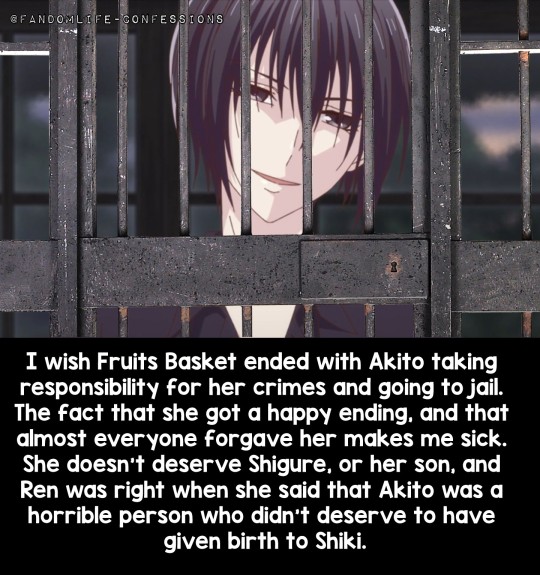
#Fruits Basket#fandom life confessions#Anti Akito Sohma#Anti Fruits Basket ending#Fruits Basket critical#Anti Natsuki Takaya#its what she deserves#The person who sent that confession was so real
32 notes
·
View notes
Text
one of the last barriers keeping jester from sending ludinus da'leth the most threatening four part save the date to her wedding has finally been removed. only the cage surrounding the moon still protects him.
#critical role#critical role spoilers#'hey beau and caleb say you're uhhhh busy taking over the moon people which is BAD and you should feel bad and honestly i don't'#'i don't know if your energy is matching our party plans right now but you DID send a really cool fruit basket to my gallery'#'opening AND you hired the shipping company a bunch and fjord is trying to figure out this networking thing so anyways if you're still'#'a super important guy by like... late spring? you can come to the reception at the lavish chateau. ask caleb for our registry. byeeee!'
763 notes
·
View notes
Text
"Anthy's Just a Middle Schooler" Is Not the Gotcha People Think It Is
I got a message saying Anthy Himemiya from the anime Revolutionary Girl Utena and the Sohma head maid from the manga Fruits Basket "aren't even similar situations lol" because "Anthy is a middleschooler."
Cool, so is Azula from the animated series Avatar: The Last Airbender. You know, that character who was:
A literal child soldier
Weaponized by her nation
Groomed by her abusive father to be emotionally invulnerable
Never shown real love or support from anyone except her mother who suddenly disappeared
And still? She doesn't get treated like a blameless, helpless victim.
She's a tragic figure, absolutely. She's sympathetic. But her cruelty isn't swept under the rug. Avatar shows how her refusal to accept help and her obsession with control lead directly to her breakdown and downfall. The story acknowledges that her actions have consequences. Even if we mourn her, we still recognize the harm she caused.
Meanwhile, Anthy Himemiya in Revolutionary Girl Utena?
Also young (but clearly capable of choice)
Surrounded by people actively trying to help her (Utena Tenjou!!!)
Betrays Utena's love and trust at the most crucial moment
Enables Akio Ohtori's abuse and cruelty while knowingly playing along
And fandom's response is... "Well, she's just a kid" and "it's internalized misogyny" and "she didn't have a choice"?
Sorry, but you can be a victim and an enabler. That's not mutually exclusive.
We're allowed to have compassion for Anthy without rewriting the narrative to excuse all her actions. Especially when other characters in other stories—like Azula, or even Akito Sohma—get dragged for doing similar or even lesser things at the same age.
Stop using "she's just a child" as a shield when you never apply that same energy elsewhere.
#fandom discourse#fandom criticism#Avatar: The Last Airbender#Azula#Revolutionary Girl Utena#Anthy Himemiya#Utena Tenjou#Akio Ohtori#Fruits Basket#Sohma head maid#Sohma maid#Akito Sohma
37 notes
·
View notes
Text
Rants from a tired writer: Tragic Backstories
Dear writers and readers/viewers (depends on medium), for the love of everything please PLEASE understand how to use tragic backstories for antagonists properly!!!
An antagonist's traumatic past is an EXPLANATION for their poor behaviour, not an excuse!! That kind of backstory is here to show that it's rare for someone to do bad things just for the sake of being bad; a lot of the time, antagonists have a reason for behaving antagonistically (or you could have someone like Emperor Belos who has a reason for behaving antagonistically but also does bad things just for the sake of being bad, which is awesome).
That's why sometimes it rubs me the wrong way when fans of a certain piece of media dislike an antagonist's redemption arc just because they felt like the show was throwing them a pity party. Of course, there are times where writers are guilty of doing that, and I'm criticizing them here as well. The antagonist's traumatic past is here to humanise them, to remind the audience and characters that in spite of it all, they're still a person. In cases where the antagonist is redeemable, this can make the audience and characters sympathise with or even relate to them.
A lot of people hate her but I don't care, I'm going to use her as an example anyway: Akito Sohma is one of those redeemable villains that gets humanised through her and Tohru's shared experience of being ostracised and abandoned.

No, you're not supposed to feel bad for Akito because she cried and said she felt lonely. You're supposed to feel bad for Akito because Tohru is the first person to treat her as a human being and not as a God, as well as validating her fear of being left behind by saying that she feels the same way. + You're supposed to feel bad for Akito because she is denied the right to be herself in every single way possible, including, but not limited to, her gender.
Akito getting redeemed does not take away all the pain and trauma that still affects the members of the zodiac that she hurt. In fact, not all of them forgive Akito, and that is okay. Akito herself states that she would have been fine not being forgiven at all, she just wanted to better herself. Her apology wasn't even done through words, but actions; she could not bring herself to say "I'm sorry" to all of her family because she didn't want them to think she was apologising just to make herself feel better or to gain their forgiveness. Anyway, I love Akito so much and I will write love letters to her in my analyses every time I have the opportunity to do so, you're welcome.
However, there are times where writers really do mess up and just want you to feel bad for their poor little moral scapegoat. I have not made a She-Ra critical post in so long, but who else fits the bill more than Catra? Her traumatic past does explain her resentment and violent tendencies towards Adora, but the show lost me the second they tried to make it into an excuse. Not only that, but making Adora "leaving" Catra a central point of the tension in their relationship when Catra was given multiple chances to leave just made me want to bash my head into the nearest wall.

The big problem with Catra is that she does not change, nor is she held accountable for her actions for longer than one episode. The only thing that did change is that she does not physically abuse Adora anymore, but the verbal and psychological abuse does remain. And lastly, the viewers and characters are considered objectively wrong for not trusting or liking her even though they have legitimate reasons not to. Of course, I'm not saying that the characters are not allowed to forgive her, but forgiveness is earned not owed, and Catra has done nothing to earn it, and it would have been nice for at least one character like Adora, Entrapta, Scorpia or anyone to have said "I'm glad that you're trying to become a better person, but I don't have to be there to witness that. I wish you the best but I don't want you in my life anymore."
Well, I have said my peace. I might start posting more writing takes on here while still talking about my favourite shows/books by using them as examples, let's see how it goes! I love writing so much so I'm very glad to be able to express that on my socials :)
#writing#rants from a tired writer#should I make this an actual tag for myself? eh y not#fruits basket#akito sohma#spop critical#writeblr
65 notes
·
View notes
Text
Tayaka makes it so hard to love this series some times like Ma'am what was the reason?
Katsuya and Akito belong is jail exactly
Sometimes I remember the fact that katsuya honda asked (told?) a child in middle school to marry him, kissed her, and then acted surprised when she knew the word "loli" because he thought she was TOO YOUNG TO UNDERSTAND IT and I seethe quietly.
Katsuyas only redeeming quality is that he helped bring tohru into the world and that's facts
#Fruits Basket#Anti Katsuya Honda#Anti Akito Sohma#Both their assess should be in jail#Anti Natsuki Takaya#Fruits Basket critical
19 notes
·
View notes
Text
Fruits Basket AU where everyone under the Sohma Curse has the weirdest or most annoying trait associated with their animal in their animal form. Not much else to this au.
Momiji doing a bunny flop in his rabbit form or Yuki doing that brux and boggling tooth and eye thing rays do when they are really happy in his rat form- kyo doing that annoying shit cats do at doors where they are weird and indecisive. These would only be traits they have in their cursed form unless it would be really funny otherwise
#I know this show is a mess but OMG this idea was so silly and stupid I needed to talk about it#I haven't seen the show in years btw#Like a decade I was 7 when I first saw the show and now I'm turning 22 like in 2 weeks#I remember hating Akito#And Tohru being a pushover#And a few specific episodes of the anime that really stuck with me#I don't hate this show#But I remember some weird shit about it and went 'damn was the writing really that bad with ending or am I misremembering'#According to Reddit I'm not misremembering they did forgive Akito wtf#But the show was something my sister showed me during a rough patch of our lives and so I can't hate it#This isn't supposed to be a critical post tho.#I'm trying to think of silly traits for each character#This isn't even actual au? It's just me laughing at animal behaviors#Should I rewatch the show?#fruits basket
7 notes
·
View notes
Text
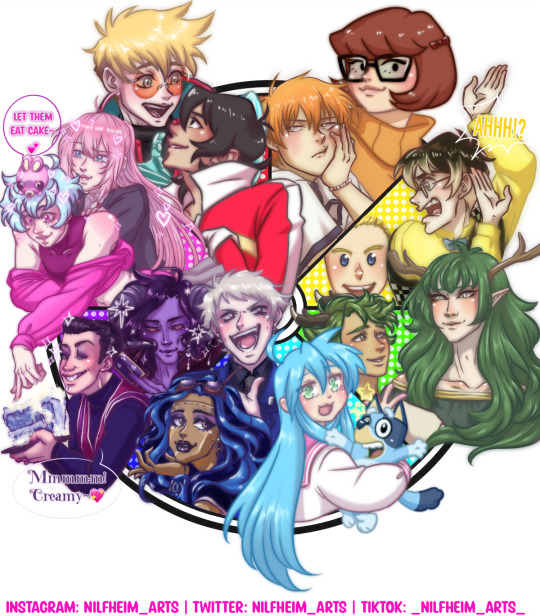
Last month I did the color wheel challenge and honestly it was so much fun!
#oc#monster high#jackson jekyll#hetalia#aph prussia#trigun stampede#vash the stampede#fruits basket#kyo soma#voltron#vld keith#scooby doo#velma dinkley#lazy town#robbie rotten#lucky star#bluey heeler#robecca steam#shikimori's not just a cutie#critical role#critical role mollymauk
262 notes
·
View notes
Text
#cr cast#laura bailey#critical role cast#vex’ahlia#tlovm#jester lavorre#imogen temult#tohru honda#fruits basket#furuba#grace stray gods#stray gods#lucina fe#black widow#maka albarn#soul eater#blaze the cat#lust fmab#lust fma#reposting because I didn’t make it a week long my bad#Lex why didn’t you include ____?#because I included characters I know and characters I think are funny#that’s why there’s no ‘other’ option because we aren’t cowards here
38 notes
·
View notes
Text
Readers and Authors: What We Owe to Each Other
(Okay wow I started this post all the way back in August and am only posting it now 🤣 ANYWAY here we go)
So, I had two experiences in the past year or so that made me think hard about how I appraise the fiction I enjoy (in any form).
I read a story that made me so angry I still think about it sometimes.
I saw people angry about the ending of the JuJutsu Kaisen manga before it was even published.
Both of these experiences were kind of baffling to me, but they helped me articulate something that I've probably always believed, even if I hadn't put it into words yet:
Endings matter.
Okay okay, that's simplifying it a lot, but bear with me.
I've had a lot of conversations with friends and family recently, trying to tease out what makes a story successful in my view. Here's where I've currently landed:
Did the story say what it set out to say?
Did the story say something worth saying?
These are obviously very subjective questions, but I think they become easier to answer when using formal analysis structures.
In three-act story structure, the last 2% or so of a story is called the resolution. The climax is over, the protagonist has either succeeded or failed, and readers/viewers want to see how the outcome of that conflict has changed the protagonist's world.
Now, there are a few ways to understand three-act structure, and my favorites are catalogued on K.M. Weiland's website Helping Writers Become Authors. Here's what she has to say about story resolutions (in a positive change arc):
First is the function of each plot point and/or story beat.
The resolution's main job is to provide a sense of closure.
Second is the relationship of a given story beat to its mirror in the other half of the story.
The resolution should mirror the Hook (the very first scenes) in some way.
Third is the metaphorical "world(s)" of each act of the story.
The resolution gives us a look at the protagonist's new normal world after the events of the story. In this sense, it should feel like a new beginning.
Fourth is the character's relationship to the thematic question, truth and lie in each act of the story.
The resolution is where we see the protagonist's new life/outlook, firmly rooted in the thematic truth.
Notice some things that are missing from that list:
A resolution does not need to answer every remaining question or tie off every loose end.
A resolution does not need to solve all the protagonist's problems.
A resolution does not need to provide a satisfying end to every character's story.
(In fact, I'd argue that a resolution works better when it specifically doesn't do those things.)
So, I think we can't really judge a story based on my two criteria until we've seen the ending, aka the resolution, because the resolution's job is to put a point on the story's theme by showing us a glimpse into the protagonist's future that meaningfully contrasts with the beginning to show us how the protagonist has changed in relation to the story's theme.
And this brings me back to the title of this piece.
What do authors and readers owe to each other?
I think, when someone is telling a story, they're essentially making a promise to the reader (or viewer). What they're saying is "I have something important to say, and I will say it over the course of this story."
When someone reads (or watches) a story, I think they're accepting the terms of that promise and saying "I will trust that you will say what you mean to say in this story, and I will trust that what you have to say is important."
So why did that story make me so angry?
The short version:
I trusted that the author would say something important, and I stuck with their story to the end only to realize how utterly shallow and unsubstantial it was!
The longer version:
The story promised to explore an idea that I thought was really interesting, and I was curious as to how the author would do that. As I read, I thought I was picking up on clues that there was more under the surface waiting to be revealed; that there was some event or idea the story hadn't disclosed yet that would put everything that had happened thus far into perspective.
Nope. There was nothing.
In effect, the story was one big "telling, not showing." There was no basis given for the premise, no reason given as to why the characters made the choices they did. The main characters honestly could've been replaced with any characters from any story and it wouldn't have changed a thing - they were dolls that the author was making do whatever the author wanted, rather than characters with motivation and personalities. They were blank slates who didn't really change or cause the world around them to change.
This made me angry because I stuck with the damn thing until the very end only to finally realize that I'd wasted my time when I got to the resolution and it didn't offer me anything more.
What did the story have to say? That the author wanted this thing to happen. Is that something worth saying? For the author, probably. For me, as a reader, absolutely not.
I felt that I had held up my end of the promise as a reader, and I felt that the author hadn't held up their end. I had stuck with the story in good faith, I'd put my trust in the author, and they squandered that trust.
I read until the ending because I'd hoped the resolution would, at minimum, provide some clarity on the story's theme, but it didn't.
This brings me to JuJutsu Kaisen.
The ending of JJK was good, actually?
On the other side of this, I was really baffled by a lot of the complaints about JJK's ending, especially those that were circulating before the manga even finished!
It really baffled me, because I really thought the author had earned the readers' trust by then. There'd been so much analysis on the symbolism and intention behind so much of the story, I was genuinely shocked that anyone lacked faith in Gege Akutami's ability to, in his words, "...end the story in the way [he] wanted." Especially from people who'd otherwise raved about the story.
When I read the final chapters for the first time, I thought they encapsulated several of the story's themes and gave us a peek at the future of the JuJutsu world for the characters we'd come to love.
To me, the final chapters absolutely served the story well in saying what the author was trying to say.
Let's review what a resolution needs to do:
A resolution must provide a sense of closure.
A resolution should mirror the hook in some way.
A resolution gives us a look at the protagonist's new normal in a way that feels like a new beginning.
A resolution shows us the protagonist's new life/outlook, firmly rooted in the thematic truth.
I would argue that the ending of JJK did all of those things, and it did them well.
This is not to say that there are no valid criticisms of JJK, but that I think the ending followed through on the promise the author made to us.
When I go back and revisit some of the most common criticisms of the ending of JJK, they boil down to a few categories:
people who wanted the author to answer every single remaining question
people who wanted the plot-based conflict (rather than the characters' internal conflict) to be solved more definitively or differently
people who wanted more characters to have a complete arc
I think people in group 1 have clearly never seen a beloved series slowly turn to crap because it kept going long after it should've ended. The questions the author didn't answer wouldn't have helped him make his theme land any better.
Meanwhile, group 2 misunderstood the point of the story. JuJutsu Kaisen is not a story about fighting, or curses, or this particular magic system. JuJutsu Kaisen is fundamentally a story about love, and it always has been. Things like curses, magic, fighting, etc... only matter insofar as they help tell that story.
Group 3 can be split up into some smaller groups. I think some of this group might actually fall under groups 1 and/or 2, in that they either just wanted more content, or they over-prioritized plot-based character goals rather than internal conflict-based character goals. As for the rest of group 3, I think they either don't understand what a character arc is, or they forget that Yuji is the protagonist, and therefore his arc is the only one that must encapsulate the main idea(s) of the story in a satisfying way.
So, what is a character arc, anyway?
In a positive change arc, the character starts out believing a lie, and over the course of the story, they overcome that lie and embrace the thematic truth.
I would argue that both Yuji and Megumi experience a positive change arc in JuJutsu Kaisen.
Positive change arcs are the most common type of character arc, but characters can also experience a flat arc or a negative change arc.
In a flat arc, the character doesn't have a lie that they need to overcome. They already believe the story's thematic truth. Instead of this character being the one to change, they use the truth to change the world around them.
In JuJutsu Kaisen, I'd argue that Nobara and Gojo have flat arcs.
Nobara came to JuJutsu Tech to be true to herself. She already knew who she was. At the end of the story, she's still the Nobara we met at the beginning. With Megumi, Yuji, and her other friends and classmates, she succeeded in growing stronger and helping to bring down Sukuna.
Gojo, as the primary mentor character in JuJutsu Kaisen, also exhibits a flat arc. His desire at the start of the story is to fundamentally change JuJutsu society by teaching the next generation, thereby raising up sorcerers who are strong enough to stand beside him. He does this so well that his students are the ones to defeat Sukuna, and not him. After his death, his students are able to carry on his mission.
In Gojo's Past arc, Suguru Geto experiences a negative change arc.
There are 3 typical negative change arcs:
The Corruption Arc: the character starts out believing the truth. Over the course of the story, they reject the truth and embrace the lie.
The Disillusionment Arc: the character starts out believing a lie. Over the course of the story, they overcome the lie, only to find that the truth is tragic.
The Fall Arc: the character starts out believing a lie. Over the course of the story, they get a glimpse of the truth, only to reject it in favor of a worse lie.
Geto starts out believing that sorcerers' duty is to protect those weaker than them (non-sorcerers) from curses,. Through the course of the story, he rejects that belief in favor of the belief that non-sorcerers are not worth saving and must, in fact, be exterminated because they are the source of all curses in the first place.
Depending on whether you see either of his beliefs as the truth (and if so, which one), his arc could be seen as any one of the negative change arcs. I personally see it as a Fall arc, especially if you include the events of JuJutsu Kaisen 0 as part of his arc.
But what's Yuji's arc? What is the theme of JuJutsu Kaisen?
Well, here's where I say that I'm planning a series of posts analyzing JuJutsu Kaisen using three-act story structure. Because I don't have enough ongoing series, apparently. 🤣
If you read this far, thanks for sticking with it! And tell me, is there a story structure or analysis tool you prefer?
#jjk#jujutsu kaisen#story#storytelling#plot#character#character arcs#character development#story analysis#theme#media criticism#three act story structure#story structure#analysis#media analysis#yes i plan to do three act structure analysis for Fruits Basket too
4 notes
·
View notes
Text

I don't trust Tohru stans that ship her with Akito. Imagine shipping her with the person who stabbed and almost murdered her and then going around acting like you love her character couldn't be me.
This applies to Takaya too their friendship is twisted and disgusting on so many levels and Akito does not deserve any sort of forgiveness for all the unforgivable shit she did to Tohru and the people she loves. Takaya will always be hated by me for writing that plotline. And the fact that she was originally going to have them end up together while Akito was still conceived as a male character is disgusting, its already bad enough with her being forced into a friendship with her abuser a romantic relationship is even worse.
#Fruits Basket#Tohru Honda#Anti Akito Sohma#fruits basket critical#Anti Natsuki Takaya#Anti Akitohru#Akito is Tohru's abuser no matter how hard Takaya tried to portray them as cute friends. She failed miserably at that anyway#Disgusting writing#Tohru Honda deserved better
12 notes
·
View notes
Text
That's why I say the hospital arc is nonsensical and everyone acts OOC
Uo and Hana ban Kyo from seeing Tohru as they are furious at him for hurting her feelings but they act all buddy buddy with the person who abused and almost murdered their best friend plus Kureno. It literally makes no sense they spend the entire story being over protective of Tohru and Takaya really expects me to believe that they would ever be friendly with her after they find out she stabbed and nearly got their friend killed. They would absolutely hate that woman and would do everything in their power to protect Tohru from her. Fruits Basket's writing quality drops off a cliff the moment Takaya forces Akito's redemption on us everyone acts OOC and they just instantly believe her when she says she is going be better when this is the point of the story where they should be the least trusting and forgiving of her she literally just attempted to murder two people and no one seems to care. The way Akito's redemption is written feels like terrible fan fiction and not something from the officially licensed product.
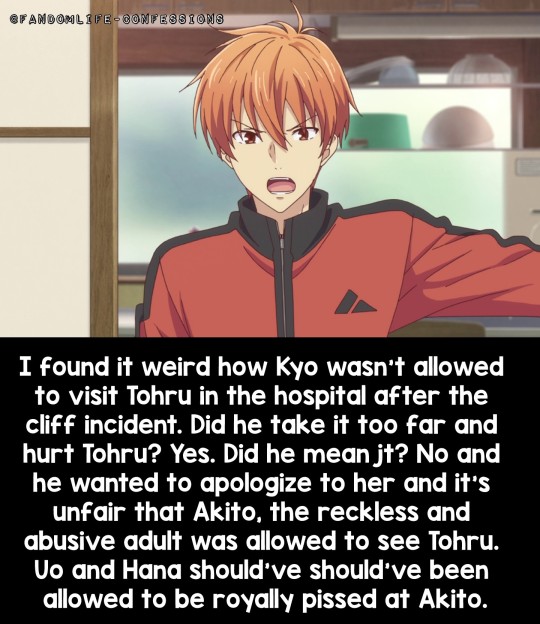
#Fruits Basket#fandom life confessions#Anti Akito Sohma#Tohru Honda#Kyo Sohma#Arisa Uotani#Saki Hanajima#They deserved to be furious at Akito for the awful shit she did to their best friend#Fruits Basket critical#Anti Natsuki Takaya#Anti Fruits Basket ending#out of character.
9 notes
·
View notes
Text
So it's been a hot minute since I've done this but I'm opening art requests for a little while!
Here are the fandoms I'll draw stuff for:
Hades 1 & 2
TGCF
Hazbin Hotel
Dungeon Meshi
Critical Role (all three campaigns)
TAZ Balance Arc
Sk8 the Infinity
Stardew Valley
Final Fantasy Vll
Fruits Basket
Also do try to keep the requests simple (i.e. portrait, X character in a pretty outfit, couples being cute/romantic/sexy/etc.), thank youu <33
#art requests open#hades#hazbin hotel#dungeon meshi#critical role#taz balance#sk8 the infinity#stardew valley#ffvii#fruits basket#tgcf
10 notes
·
View notes
Text
Why Does the Sohma Family's Head Maid Get Dragged, But Anthy Himemiya Doesn't? (aka: Fandom's Bias Toward "Aesthetic Victimhood")
It's honestly wild how often I see fans of the manga Fruits Basket rip into the Sohma family's head maid (and rightfully so!) for being a toxic enabler. She's constantly called out for upholding the family's oppressive traditions, enabling Akito's emotional and physical abuse of the Zodiac, and using Akito as a weapon in her feud with Ren Sohma. People fully recognize that she's part of the system—even if she's not the one at the top—and that her loyalty to tradition is more about control than care.
But then... we get to the anime Revolutionary Girl Utena, and suddenly it's crickets.
Anthy Himemiya enables every aspect of Akio Ohtori's abuse:
She performs the role of the Rose Bride without protest.
She actively sabotages Utena Tenjou—the one person trying to liberate her.
She helps Akio manipulate, seduce, and discard others, often doing it with eerie detachment.
She only leaves after Utena nearly dies because of her betrayal.
And somehow? Fandom paints her as a helpless martyr. A tragic figure. A misunderstood victim. She gets the soft-focus lens that the Sohma maid never does.
Why?
Because Anthy looks like a victim.
Because Utena frames her pain with aesthetics, symbolism, and ambiguity.
Because she's quiet, beautiful, and "complex," so people project empathy onto her—even when she enacts harm.
Meanwhile, the head maid is "cold," "harsh," and "devoted to tradition," so people have no problem reading her as a villainous enabler.
But here's the thing: they both enforce oppression.
They both protect abusers and sabotage liberators.
They both make choices—and yes, they're shaped by trauma, but trauma doesn't erase complicity.
It's time to stop excusing Anthy's actions just because they’re beautifully framed. Victimhood and harm are not mutually exclusive. You can be both oppressed and an enabler of oppression—and the sooner fandom reckons with that, the more honest our conversations will be.
#Fruits Basket#Sohma head maid#Sohma maid#Akito Sohma#Ren Sohma#Revolutionary Girl Utena#Anthy Himemiya#Utena Tenjou#Akio Ohtori#media consumption#media criticism#media analysis#media literacy#fandom discourse#fandom criticism
7 notes
·
View notes
Text
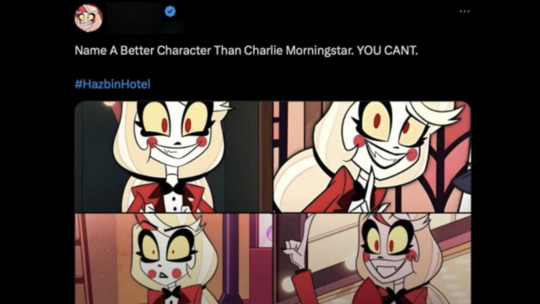
Call me Betty Hutton because, yes, I can.
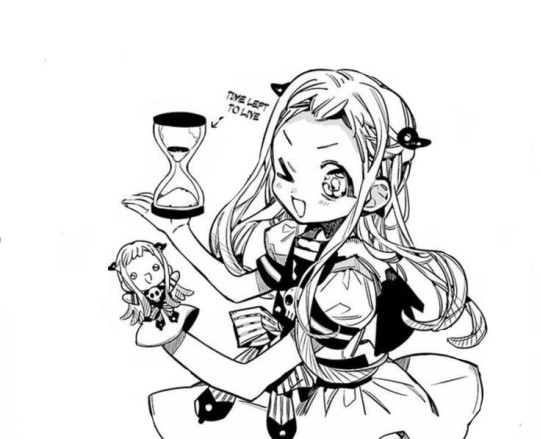
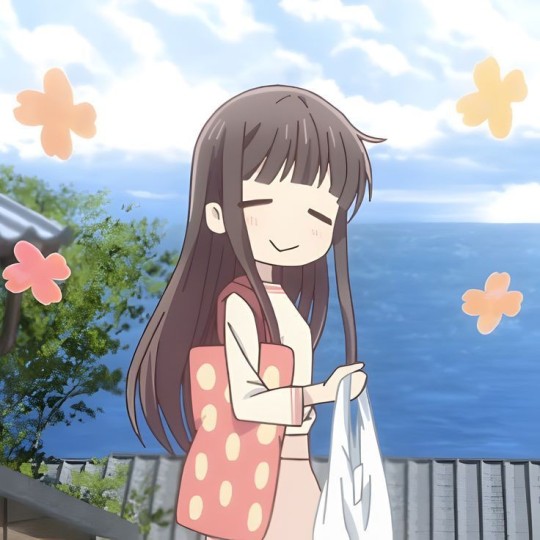
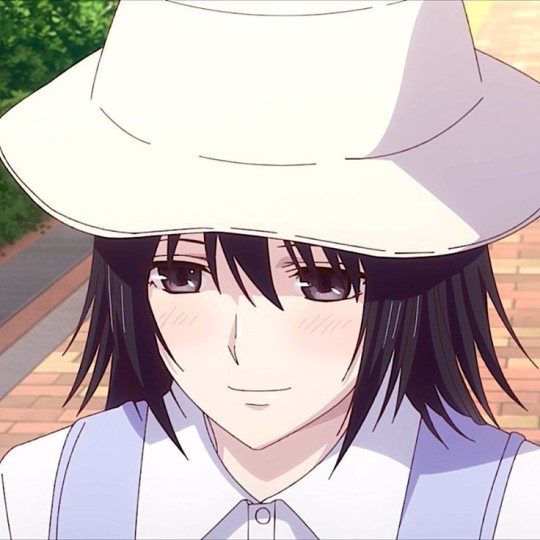
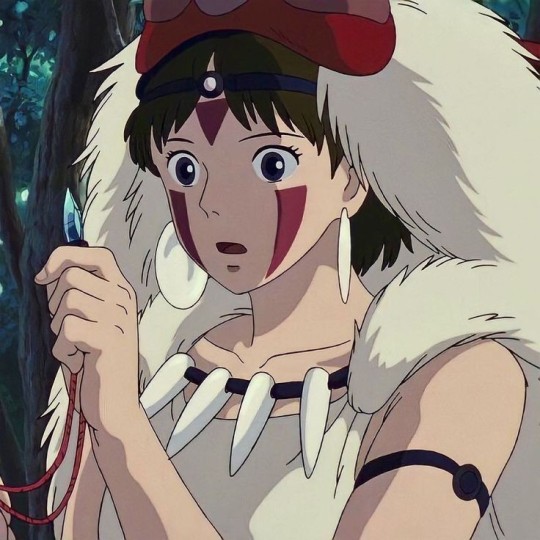
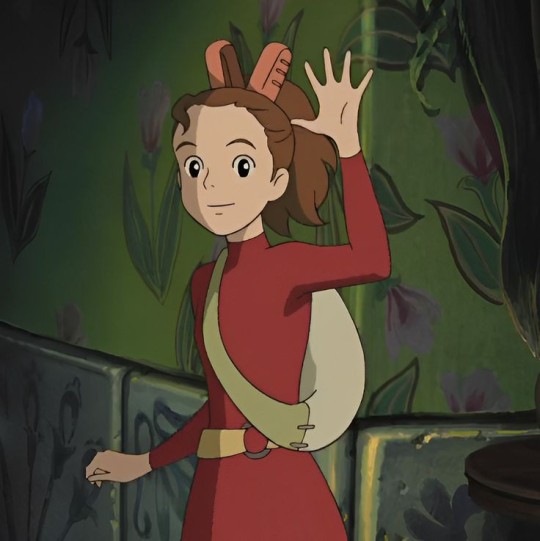
#tbhk#fruits basket#yashiro nene#tohru honda#akito sohma#san princess mononoke#arrietty#vivziepop critical
44 notes
·
View notes
Text
“As a schoolboy, [the first psychoanalyst in Japan, Heisaku] Kosawa had idolised both Shin Buddhism’s 13th-century founder, Shinran, and a modern proponent, the Shin priest Jokan Chikazumi. Chikazumi befriended Kosawa and became a teacher and role model to him. Nevertheless, while studying medicine at Tohoku Imperial University a few years later, Kosawa’s focus shifted to Freud. In a personal letter, written in faltering and oddly romantic German, he credited Freud with seeing into the human heart as clearly as he and his fellow students had learned to observe cells under a microscope. By comparison, Kosawa’s professor at Tohoku cut an unimpressive figure. In 1932, the young student begged money from an elder brother, left his professor behind (he was told never to come back) and set off for Europe to meet Freud face to face.
He didn’t receive quite the reception he’d hoped for. Meeting the elderly Freud at the famous house at Berggasse 19 in Vienna, a Japanese friend had to interpret for him. Freud himself advised Kosawa to find a local girlfriend to bring his German up to speed.
Language was not the only thing separating the two men. As far as the philosophical and religious implications of psychoanalysis were concerned, Freud strenuously disagreed with both Kosawa and with another major pioneer of psychoanalysis in Asia at the time, Girindrasekhar Bose in Calcutta. With only a couple of notable exceptions, the Freud circle treated religion as a purely psychodynamic and social phenomenon, reducible to inner drives and conflicts. They made their camp in the now-familiar territory of faith as wish-fulfillment, avoidance of reality, a means of keeping a lid on society, and the locus of a great deal of obsessive-compulsive behaviour.
For Bose and Kosawa, this merely served to highlight Freud’s parochialism: his lack of experience with non-European cultures and patients. As a matter of fact, Kosawa agreed with his hero that religion was connected with guilt. He just thought it involved guilt of a different type. Freud said that religion derived (both in historical time and in the life of each individual) from the need to assuage one’s fear of a father figure: really, it was a kind of ‘deferred obedience’. Kosawa hoped to persuade Freud that this placatory impulse gave rise to an inadequate religion, and that another sort of guilt was far more important.
He offered Freud a simple illustration. Imagine that a child drops a plate in the presence of his parents. When he seeks forgiveness from his father, the child is rebuffed. He experiences a pang of emotion linked both to fear of impending punishment and to anger and resentment at his father for his harsh reaction. This, according to Kosawa, approximates Freud’s understanding of guilt in the religious context. But then the child asks the mother for forgiveness — and receives it. The mother takes the child’s fearful and rebellious guilt and alchemises it into a ‘reparative guilt’: an overwhelming response to total, unconditional forgiveness. This latter reaction was, for Kosawa, a truly ‘religious state of mind��� and he saw it as the core of his own Shin tradition. Freud appeared unmoved, however. ‘I have received and read your essay and will save it,’ he wrote rather distantly. ‘You do not seem to intend to use it immediately.’ There is no evidence that he gave it another thought.”
#Buddhism#I don’t think you can watch a critically acclaimed anime series and not see this played out#the psychosexual imagery in so many anime is so obvious#think of all the sexuality and Oedipal stuff in nge#or the phallic imagery and inc*st in rgu#or the parental dynamics in fruits basket#interested in why manga and anime have such a draw to this framework#but not mad about it at all#and how different it’s eventual conclusion is from western psychoanalytic influenced fiction!
12 notes
·
View notes